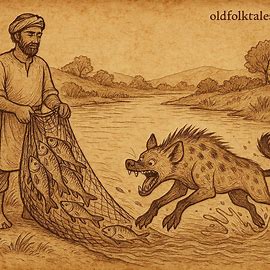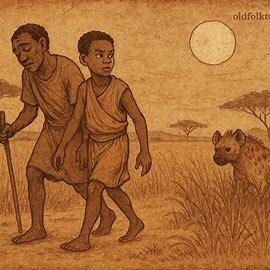Two men, elder and younger, once said to each other, “Let us go hunting!” The younger man had two loyal dogs, one named Mutelembe and the other Ngunga. Together, the brothers set off into the wilderness, leaving behind the safety of their village to prove their skill in the hunt.
They built a small hut at the edge of the game ground and stayed there. Each day, the younger brother’s bow was steady, his aim unerring. He brought down deer, antelope, and small game with ease. The elder, though he tried, returned empty-handed. Day after day, the younger supplied their food, while the elder grew more restless and ashamed.
A full month passed. At last, the younger brother said, “Elder, let us go home now.” The hunt was over. Their baskets were filled with dried meat. But in the elder’s heart a dark thought stirred.
He brooded as they walked. We came hunting together. The child killed all the game. I, the elder, killed none. When we arrive home, shame will fall upon me. Jealousy consumed him, and in a moment of envy, he struck his younger brother down.
READ THIS: Mr. Carry-Me-Not and Mr. Tell-Me-Not | A Folktale from Angola on Listening, Trust, and Consequences
The elder cut open his brother’s body, removed the bowels, and tossed them to the dogs. First, he offered them to Mutelembe. The faithful hound sniffed and turned away. Then he offered them to Ngunga. Ngunga too refused. Both dogs gazed at the lifeless body of their master, their eyes burning with grief.
The elder gathered the meat from the hunt into a basket. But then, to his horror, the dogs began to sing:
“Ndala the elder and Ndala the younger,
They went into the world to destroy others.
We praise Mutelembe and Ngunga,
To whom were thrown the bowels;
They refused to eat.”
Fear gripped the elder. If these dogs return home, they will reveal my crime. Desperate, he set down the basket and killed one of them. Yet as he walked on, the dead dog appeared alive again, padding along beside him, singing the same mournful song.
Terrified, he set down the basket once more and killed the second dog. He dug a grave and buried them both, patting the earth down with trembling hands. But no sooner had he lifted his basket and moved on than the two dogs reappeared, their voices rising in chorus:
“Ndala the elder and Ndala the younger,
Went into the world to kill others.
We praise Mutelembe and Ngunga;
They threw them the bowels;
They refused to eat.”
The elder staggered forward, haunted by their song. When at last he neared the village, he tried to compose himself. He dressed in clean clothes, straightened his posture, and entered his house as though nothing had happened.
The villagers greeted him. “You went two. Where is your companion?”
He lied quickly: “He went to his own country.”
But before he could speak further, the dogs appeared. They ran straight into the house, their voices carrying the truth for all to hear:
“Ndala the elder and Ndala the younger,
Went into the world to destroy others.
We praise Mutelembe and Ngunga;
To whom were thrown the bowels;
They refused to eat.”
The villagers gasped. “Listen! The dogs are singing! Ndala the elder, you went with your younger, and you killed him! His dogs have told us!”
Grief swept the village. They mourned the young man who had fed them, who had been betrayed by envy. And though the elder had sought to hide his crime, truth carried on the voices of loyal animals could not be buried.
Moral Lesson
This tale warns that jealousy corrodes even the closest bonds. The elder brother let envy eclipse gratitude, destroying his own family. Yet loyalty and truth cannot be silenced. The dogs, faithful to their master, became the voice of justice, revealing the hidden crime.
In the end, the story teaches us that greed and envy lead only to shame, while loyalty and truth endure beyond death itself.
Knowledge Check
1. Who were the two brothers in the story?
They were Ndala the elder and Ndala the younger, who went hunting together.
2. What were the names of the dogs?
The dogs were named Mutelembe and Ngunga.
3. Why did the elder kill his younger brother?
Out of jealousy and shame, because the younger had killed all the game while he had none.
4. How did the dogs respond to being offered their master’s bowels?
Both dogs refused to eat and instead sang of the crime.
5. What is the main lesson of this folktale?
That jealousy destroys, but loyalty and truth always prevail.
6. What is the cultural origin of this story?
It is a traditional folktale of the Kimbundu people of Angola.
Source: Folk-tales of Angola,” Hé̄li Chatelain, 1894; oral tales from Kimbundu people, Angola.







